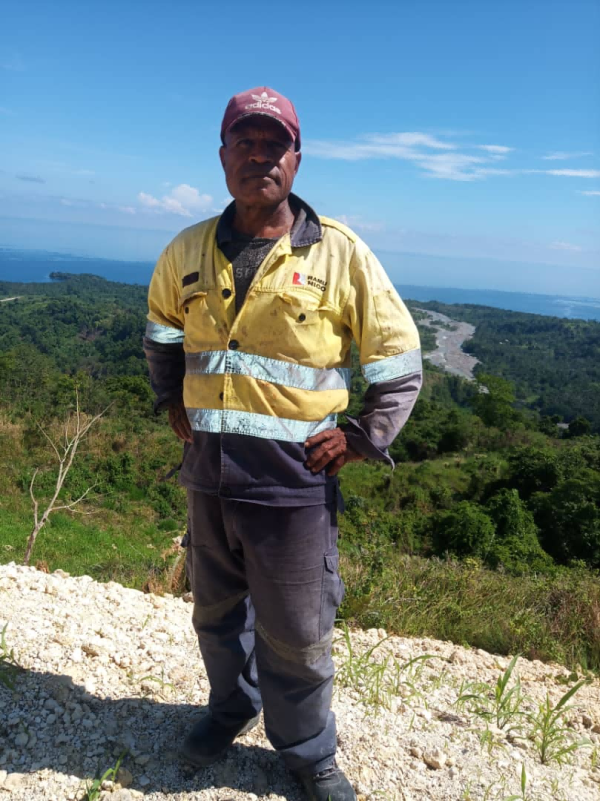In the humble village of Basor, just across the Yaganon River near Ramu NiCo’s Basamuk Refinery, 56-year-old Markus Bob stands as a living testament to the sweat and dreams that built an industrial cornerstone in a region transformed by development.
He is the last of the original 21 bulldozer operators and truck drivers recruited by Ramu NiCo project to clear the vast expanse of land for the refinery in 2007.
As the last golden rays of the 20 November, 2024 sunset spread over the Basamuk campsite from the Finisterre Range, the echoes of his past rang deeply, reminding him of the camaraderie and challenges that marked those early days.
Bob’s journey began over three decades ago when he was a young man, eager to contribute to his community and carve out a better future.
He had learned to operate big trucks in Vanimo, West Sepik while living with his elder brother from 1990-2005.
In 2007 when Ramu NiCo project began recruitment, a fellow Raicoast man approached him and told him that the company wanted men who know how to drive big trucks and can operate bulldozers and must also possess a valid driver’s licence.
That wasn’t a problem for him. Bob has the habit of renewing his operator’s licence every now and then before it expires.
When he approached the Ramu NiCo project mini office in Basamuk, he was automatically recruited and together with other local operators and drivers, they formed a 21 men team and cleared the whole Basamuk land especially where the refinery would sit on.
Alongside his fellow recruits, he transformed the rugged landscape, operating heavy machinery that seemed to dance under his command.
“We were a team, a family,” he reflected as he smiled. “We worked hard, knowing that we were paving the way for something bigger.
Most of them were locals from around the Basamuk area and other parts of Raicoast district in Madang Province.
“But as time passed, one by one, my friends left—some for new opportunities, others because of age, and some we lost too soon.” Bob recalled.
Now, as he surveys the refinery from a distance, Bob feels a profound sense of solitude. He is not just the last operator; he embodies a history that is fading.
The laughter, the shared meals, the nights spent under the stars talking about their hopes—all remain vivid in his memory.
With every passing year, he feels the bittersweet weight of being a living archive of their collective story, an unwritten history into the very land beneath his feet.
Yet, the land holds more than memories of labour and machinery; it also cradles local legends that bind the spiritual and physical.
The mountains surrounding Basamuk are said to hold a secret, a spirit residing in the form of a great pig, revered and feared by the villagers.
“When we began our work, we heard the stories,” Bob recounts, laughter dancing in his eyes. “They said it was a guardian of the mountain, protecting the land from outsiders.”
“When we graded the huge mountain down, we saw the great spirit pig dashed out from its secret place with so much might and power that it disappeared quickly into the mountains behind Basamuk.
In 2012 when the company commissioned its first production, he was sent to work in the Limestone plant a little bit further from the refinery and faithfully served Ramu NiCo in the last 12 years.
Today Bob admires the huge refinery, the tall steamers and machinery and wonders how complex its existence really is.
But then, he used to smile and proudly accept the fact that he is the last man standing. The last of the first 21 recruited to set the foundation of this world class nickel and cobalt mine.
Bob is proud to say that Ramu NiCo has changed the lifestyle of the people living around the Basamuk area.
Many of them are employed by the company, many people now have money in their pockets and are buying things they didn’t own 10 years back.
“Ramu NiCo has indeed changed our lives and I am so happy to be one of the operators who performed the groundwork to build this refinery.

